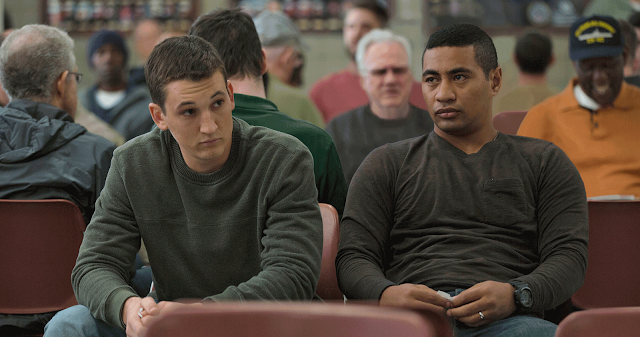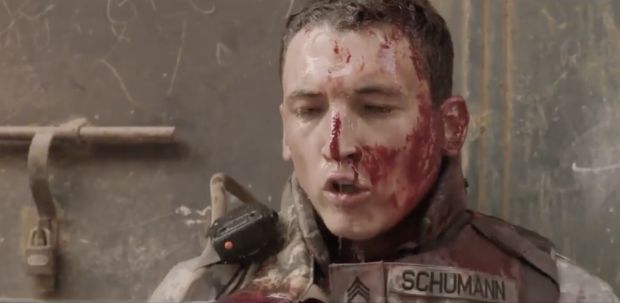In the best scene in American Sniper, a one-legged veteran (Mindhunter’s Jonathan Groff) cautiously approaches Bradley Cooper’s titular Navy SEAL in an auto shop and warmly thanks him for saving his life during battle. It’s a moment that ordinarily would play as sweet and triumphant, but instead it’s awkward and tentative, as Cooper’s laconic soldier is utterly incapable of handling such direct gratitude. Now, Sniper screenwriter Jason Hall homes in on that discomfort with Thank You for Your Service, a humane and sober movie that tackles the war after the war.
Based on a book by David Finkel, Thank You for Your Service is a film of such unimpeachable decency—well-intentioned, understanding, respectful—that it’s virtually impossible to disapprove of. But those same qualities make it difficult to enjoy, or even really admire, as a piece of cinema. It’s more message than movie, and while the message—that post-traumatic stress disorder is a serious illness, and that many of our veterans need psychiatric help far more than they need banal platitudes—is undoubtedly worth conveying, the delivery system lacks oomph. It’s a movingly penned essay that just happens to unfold on screen.
The limited vitality it does generate stems primarily from its cast, which performs the material with both dignified sensitivity and raw prickliness. That tricky combination is becoming something of a calling card for Miles Teller, the prodigiously talented actor who, in his best roles (Whiplash, The Spectacular Now), spikes his obvious intelligence with a certain edge, making his ostensibly wholesome characters unpredictable and a little dangerous. Here, Teller plays Adam Schumann, a staff sergeant serving in Iraq in 2007 whose mission is to intuitively scan roadways for improvised explosive devices. In the film’s visceral and economical opening scene, something goes boom, and Schumann (“Shoe” to his pals) finds himself carrying a wounded soldier down a flight of slippery stairs, his comrade’s blood dripping down onto his face and into his eyes and mouth. It’s an upsetting image, and if it’s unpleasant for you, just imagine how Schumann feels.
Wisely, Hall doesn’t linger in Iraq; Thank You for Your Service is about the tragic aftermath of combat, not the grisly act itself. His script follows three different soldiers—buddies who partake in the sort of playful, slightly artificial joshing often found in movies—as they attempt to reenter polite American society. Schumann initially appears to have it the easiest; he’s happily married to a supportive wife, Saskia (Haley Bennett, from The Girl on the Train), and his biggest problem seems to be that he didn’t know that his cherubic four-year-old daughter doesn’t like chocolate chips in her pancakes. Things are harder for Tausolo Aieti (Beulah Koale), aka Solo, who suffers from memory loss and struggles to carry on a conversation. Worst off is Will Waller (Green Room’s Joe Cole), who spends his flight home picturing his wedding, only to find that his fiancée has left him and has taken the furniture to boot.
“You had a rough landing,” Schumann says to Waller during one of their bro-downs at a local watering hole. But as it turns out, Schumann’s landing wasn’t so soft either. As Thank You for Your Service progresses, he and Solo grow to appreciate the extent of their trauma, and they start to realize that they’re in dire need of medical care.
It is during this process where Hall, a first-time filmmaker, begins to bump up against limitations, either his own or those of the medium. It is difficult for a director to depict men fighting an invisible foe, and while Hall does his best to visualize their plight, he never quite succeeds. Most of his devices are gimmicky, as when Solo repeatedly hallucinates the vengeful return of a soldier he witnessed burn to death; that’s disturbing, sure, but watching an apparition emerge in a mall food court feels tacky rather than genuine. Only once, during a seemingly tender sex scene that suddenly transforms into a nightmare, does Hall communicate his characters’ predicament with the necessary clarity.
Still, even if Hall struggles with his mechanics, he knows how to get his point across. And Thank You for Your Service is at its most powerful when it functions as a muted but insistent attack on the bureaucracy that ensnares the Department of Veterans Affairs, which the film portrays as a rudderless agency that’s woefully unequipped to help its anguished members. That could play as polemical, but Hall modulates his rage, expressing it through his characters’ quiet, persistent pain. The movie’s most galling scenes play at low volume, such as when Schumann’s former commander casually equates seeking help with showing weakness, or when a supervisor tasked with assessing Solo’s health proves more interested in ordering steaks. These softly cutting moments reinforce the film’s enduring image of the VA: neither a magical panacea nor a cesspit of corruption, but an understaffed, overcrowded waiting room, where soldiers are told to put their hopes for salvation on hold for 6-to-9 months.
Hall’s grasp of this thematic material is strong, so it’s bizarre that he felt compelled to turn his nuanced character study into a suspense thriller. Simply put, Thank You for Your Service takes a swan dive in its third act, which trades astutely internalized torment for ticking-clock melodrama and bursts of gunfire. Essentially, the film goes to war with itself, torn between the impulse to comfort viewers with triumph—an unrecognizable Amy Schumer pops up to give Schumann some much-needed closure that feels too tidy—and the honorable desire to resist manufactured catharsis. To his credit, Hall serves the compulsory syrup in drips rather than dollops. But the movie concludes with a forced optimism that, weirdly, plays like its own form of inadvertent betrayal. It suddenly forgets, where it had previously made so terribly clear, that for these characters—and thousands more like them—the war has no end in sight.
Jeremy Beck is the editor-in-chief of MovieManifesto. He watches more movies and television than he probably should.




